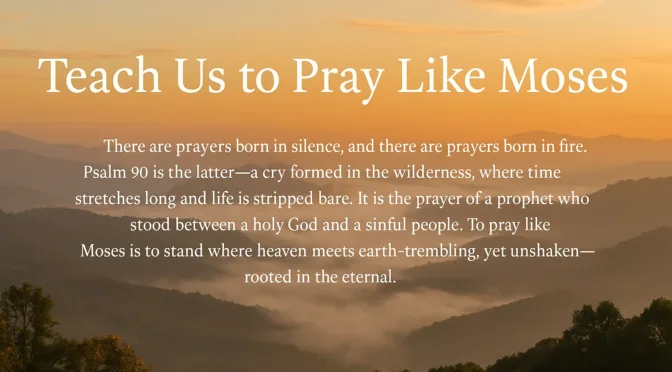There are prayers born in silence, and there are prayers born in fire. Psalm 90 is the latter—a cry formed in the wilderness, where time stretches long and life is stripped bare. It is the prayer of a prophet who stood between a holy God and a sinful people. Teach us to pray like Moses—to stand where heaven meets earth, trembling, yet unshaken—rooted in the eternal.
This is no shallow prayer. It does not begin with man’s needs, but with God’s nature. It does not hide sin—it exposes it. It does not rush—it waits. It asks not merely for relief, but for wisdom, mercy, and eternal fruitfulness. If you would learn to pray like Moses, you must learn to pray in the shadow of eternity.
1. Anchor Your Heart in God’s Timelessness
“Lord, You have been our dwelling place in all generations.” (Psalm 90:1, NASB)
The prayer of Moses begins with God as home. Before requests are made, worship rises. This is the foundation of true prayer—not panic, but praise. Moses teaches that God has always been the refuge of His people. He is not distant. He is not new. He is ancient, tried, and sure.
To pray like Moses, begin not with your fears but with the faithfulness of the Lord. Name His past works. Remember His unshakable presence. When you pray, let your soul rest in the truth that God is your dwelling place, generation to generation.
2. Exalt the God Who Was Before All Things
“Before the mountains were born…from everlasting to everlasting, You are God.” (Psalm 90:2, NASB)
Moses speaks from the heights of revelation. He exalts the eternality of God—the truth that God existed before time and will exist beyond its end. This is not poetic flourish—it is spiritual clarity.
Prayer that moves heaven begins in awe. God is not a helper to summon; He is the I AM, the eternal One. To pray like Moses is to place your temporal worries into the hands of the One who reigns outside of time. This perspective reshapes the heart.
3. Embrace the Brevity of Life and the Need for Humility
“You turn mortals back into dust…a thousand years in Your sight are like yesterday.” (Psalm 90:3–4, NASB)
Moses teaches us that prayer must be honest. We are dust. We fade. The God who made us knows our limits. In His eyes, generations pass like a breath.
To pray like Moses is to pray with humble clarity. It is to lay down pride, confess our frailty, and recognize the urgency of each passing day. This does not lead to despair—but to deeper dependence. For when we acknowledge our limits, we throw ourselves wholly upon the mercy of the limitless One.
4. Bring Sin into the Light
“You have placed our guilty deeds before You, our hidden sins in the light of Your presence.” (Psalm 90:8, NASB)
There is no hiding in the light of God. Moses knew this. He saw how sin kindled God’s righteous anger and how only confession and intercession could stay His hand.
To pray like Moses is to bring every hidden thing into the open. No excuses. No diversions. Only raw truth before a holy God. And yet this is not the end—it is the beginning of restoration. For God desires truth in the inward parts, and He covers the repentant in mercy.
5. Ask for Wisdom in a Wasting World
“So teach us to number our days, that we may present to You a heart of wisdom.” (Psalm 90:12, NASB)
This is the great cry of the psalm—the centerpiece of the prayer. Life is short. Troubles are many. So what does Moses ask for? Not more time, but wisdom. Not longer years, but a heart rightly ordered before God.
To pray like Moses is to ask God to teach you the value of each day, to walk in purpose, to waste nothing. It is to exchange shallow living for eternal vision.
6. Cry Out for Mercy and Satisfaction in God
“Satisfy us in the morning with Your graciousness, that we may sing for joy and rejoice all our days.” (Psalm 90:14, NASB)
Here the tone turns. Moses, who beheld plagues and wonders, who endured rebellion and wrath, knows where true joy is found. Not in victory, not in ease—but in God’s steadfast love.
To pray like Moses is to ask for mercy daily, to rise with a cry for soul satisfaction in the presence of God. This is the prayer that sustains in desert places. This is the joy that outlives sorrow.
7. Intercede for God’s Glory to Be Revealed Again
“Let Your work appear to Your servants and Your majesty to their children.” (Psalm 90:16, NASB)
Moses does not end his prayer with himself. He looks ahead—to the next generation. He pleads for the glory of God to be seen afresh, for His power to move once more among His people.
To pray like Moses is to labor in intercession, to yearn for God’s majesty to awaken the hearts of children and grandchildren. It is to believe that the God who parted the sea can still move mountains today.
8. Ask God to Establish What Only He Can
“Confirm for us the work of our hands; yes, confirm the work of our hands.” (Psalm 90:17, NASB)
At last, Moses asks for lasting fruit. He does not want empty toil. He wants labor made eternal by the hand of God.
To pray like Moses is to cry out: “Make it count, Lord.” Let the work of my life—however small—be sealed with Your favor. Establish it. Breathe on it. Let it echo into eternity.
⸻
O God who dwells where time has no end,
Establish the path where Your servants bend.
Teach us to walk with hearts made wise,
And let Your glory fill our skies.
⸻
Prayer
O Lord, our dwelling place in every generation, teach us to pray like Moses. Let our prayers rise in reverence, shaped by eternity and rooted in truth. Help us confess what You already see, to number our days, and to walk wisely. Satisfy us each morning with Your mercy, and let our work endure by Your hand. May Your glory rest upon us and shine through us. In the name of Yeshua our Messiah, we pray. Amen.
⸻


